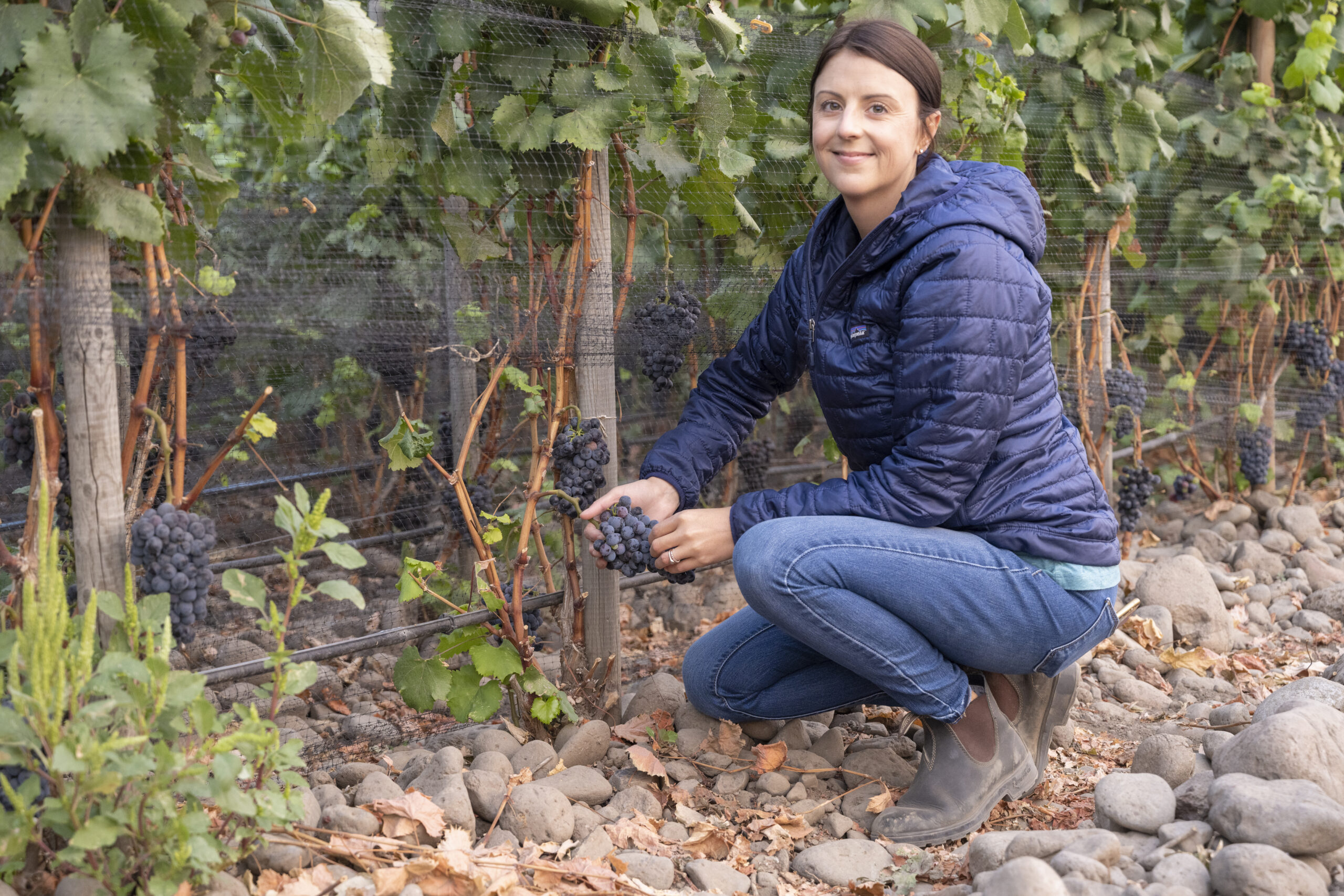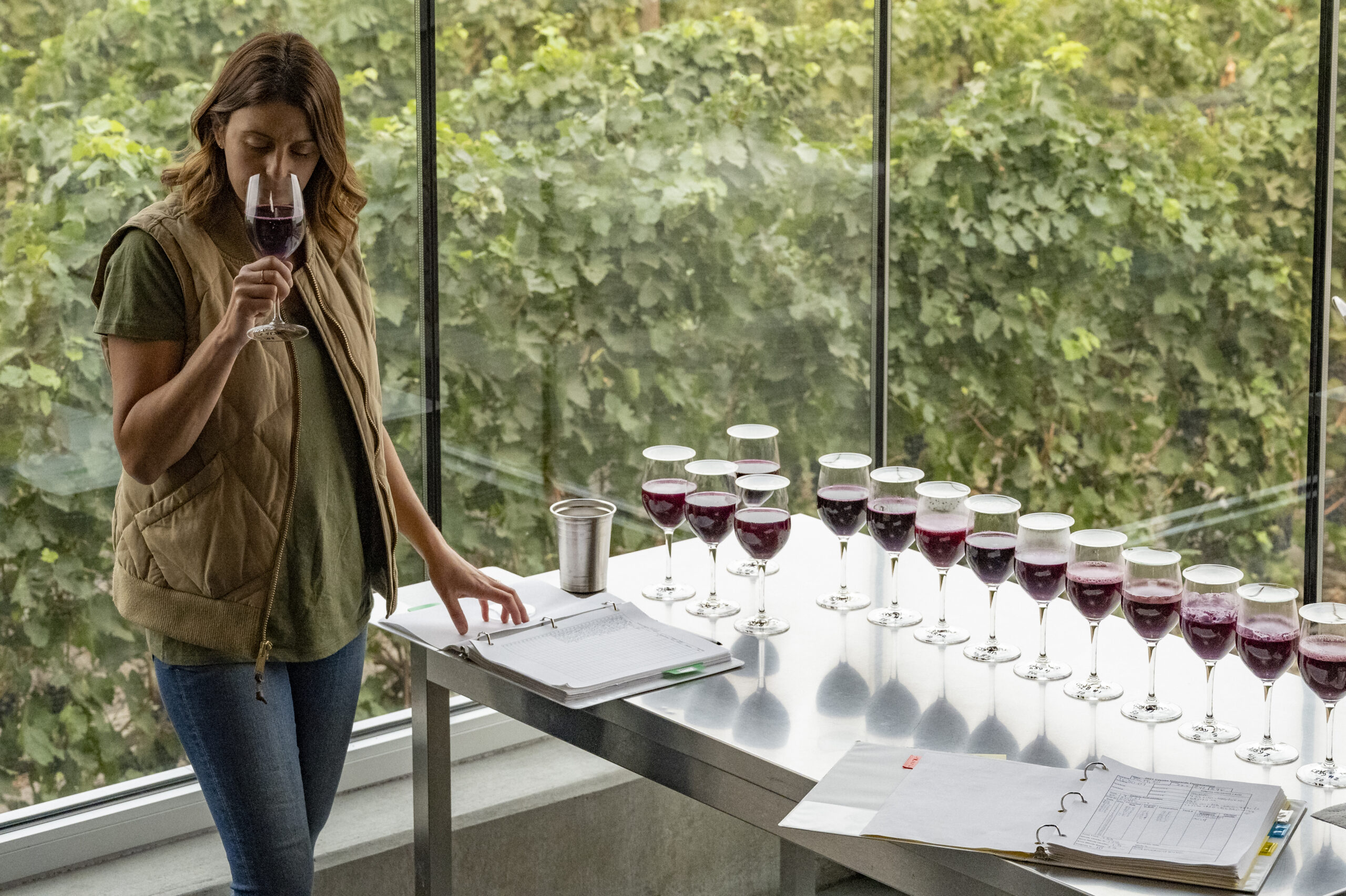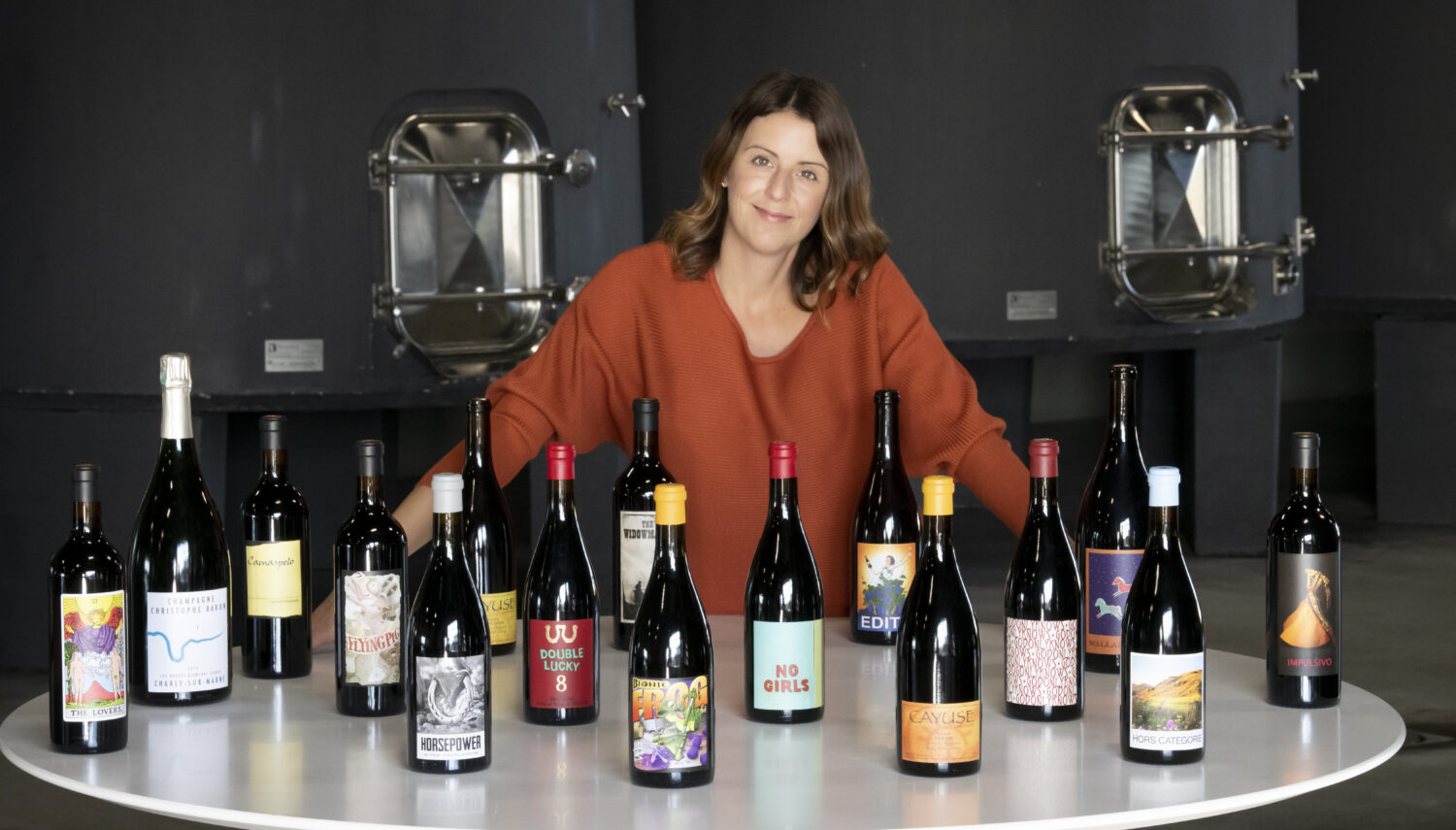Elizabeth Bourcier is one of the most celebrated graduates of the WWCC Enology and Viticulture program. Recently, the resident vigneronne at Cayuse Vineyards, mind behind the No Girls and La Rata brands, and expectant mother chatted with me about industry trends, her inspirations, and life manning the ship in what is arguably Milton-Freewater’s most venerable estate.
Will Marengo: Can you please update me on some basic information: date of EV graduation, current employer and position, social media handles, preferred contact details?
Elizabeth Bourcier: I graduated in 2004.
WM: So were you one of the first classes?
EB: I was. I am now resident vigneronne at Cayuse Vineyards. Our Instagram handle is @bionicwines, and my personal account is @elbourcier, though I don’t use it for a ton of wine stuff. My preferred method of contact is via email at elizabeth@cayusevineyards.com.
WM: How did you get into wine?
EB: Oh man (laughter). I was pretty young, my parents enjoyed wine with dinner and would share with us and let us try it.
WM: From what age?
EB: I was in high school.
WM: So not 7 or 8 then.
EB: (laughter) No.
WM: You never know.
EB: When I actually started getting interested and asking my dad about it, I was in high school. They took us on a trip to France around that time as well.
WM: Where did you grow up?
EB: The Seattle area.

WM: Just asking because of your French surname, are you first-generation American?
EB: No, my parents are from the east coast originally. My last name is Bourcier and there is a Château Haut-Bourcier in the Côtes de Blaye in France. There’s a really distant bloodline, and we’ve been in contact with their family and sometimes keep in touch with them. My parents have gone to visit their château, so there is a cool connection there, but it goes back many generations. I suppose there is wine in my blood, so I got interested and would ask my dad lots of questions about it. I was surprised to learn that you could “study” wine.
WM: Was there a particular wine growing up that really caught you?
EB: Well my parents really loved French wine, so they would drink a lot from the Loire Valley.
WM: My favorite. Do you remember what wine it was in particular? Something weird? Savennières?
EB: My dad was into Chinon, so I remember drinking Cab Franc. I don’t remember which wine in particular, but I was intrigued by the making of wine and all the science behind it. I would also see my parents drinking Washington State wine, and I was young and excited to learn about the grapes growing in my home state. I found out about the EV program in Walla Walla and drove out when I was just about to turn 18. I met Myles Anderson from Walla Walla Vintners, who was running the program at the time. He took the time to show me around the school and the winery, and I was like, “Yeah, this is what I want to do.” So I packed up my stuff and moved to Walla Walla and joined the EV program.
WM: Amazing that you knew you wanted a career in wine at such a young age.
EB: Well when I got here I certainly wasn’t a wine expert, but I knew what I wanted to do early, yeah. There wasn’t a whole lot going on out here at the time, but I saw the potential.

WM: Is there someone in the EV world that you admire, including fellow EV alums?
EB: I have to start with Stan Clarke, who co-founded the EV program with Myles and was so important in my early career. He really guided me as a young student and was super influential in terms of motivation and excitement about wine. He is such a big reason for me being where I am today. There are also some international winemakers who have given me insight towards the style of wine that I strive to craft. I make a wine here called La Rata, it’s based off a wine that really inspired me called Laurel, which is made by Clos Erasmus’s Daphne Glorian in Priorat. Daphne is a vigneronne who was really one of the founders of that area. She’s a woman who paved the way in Catalonia and got the Priorat region on the map in terms of quality production. I’ve never met her but I would love to meet her someday.
WM: I never got the chance to meet Stan Clarke, but he is such a highly regarded figure in our valley. For the wine style part, I guess I was expecting some Rhône Valley producer; it’s cool that you say Priorat.
EB: I love the Rhone too! But I really enjoy Spanish wines, and we grow Grenache, Tempranillo, Syrah, and Cabernet at Cayuse. So I wanted to make a blend of those grapes in the style of Priorat for La Rata. I also appreciate that Spain in general really embraces the idea of women growing wine.
WM: Out of curiosity, what are some of your other favorite wines to drink?
EB: Working with Christophe Baron I get the opportunity to try a lot of great Champagne. Jacques Selosse and Billecart-Salmon are some of my favorites there, and I also love Jean-Luc Jamet for Syrah in the Northern Rhone. I find myself drinking a lot of Pinot Grigio from Alto Adige, which is nothing like the wines we grow here, but I enjoy the minerality of it. I tend to lean into the Old World. In the New World I gravitate towards lower alcohol wines from Willamette, as well as more restrained wines from California. I like Spottswoode and Hanzell a lot.
WM: What’s special to you about working in the wine industry?
EB: There’s so much out there. No one will ever know everything about wine: the varietals, the farming, the growing areas, production. There is so much to learn and no one is TRULY an expert. It’s such a huge field of study that is both overwhelming and intriguing, and it never gets boring.
WM: That’s refreshing to hear in an industry with so many massive egos.
EB: You have to be humble about it; nobody knows everything about winemaking.
WM: Sounds like you have an inquisitive nature. Was there a favorite subject in school? Were you a science person growing up?
EB: I wasn’t a math and science person, and the struggle to learn those topics as they apply to wine made me really appreciate those fields a lot more. Wine is science, and that’s really neat.
WM: So in high school you didn’t envision yourself using the periodic table on a regular basis as an adult.
EB: (laughter) Definitely not.
WM: What is your favorite part of your job?
EB: I like the whole experience of seeing the cycle of the year: watching the vines grow, the plants starting to produce. I’m currently looking out at the crew from my office window. The cycle of the grapes coming in and getting to put my own spin on it, the changing vintages, having to adapt and being able to hear from the consumer about the final product. It’s surreal watching something develop literally from the ground up like that, and bringing people pleasure with your wine and helping to make memories.
WM: Your title, “vigneronne,” is a French word without a direct English translation, but it basically means “tender of the vines.” Are you as involved with the growing of the grapes as you are with cellar work?
EB: Well, my focus is production, but I work very closely with our vineyard manager. We’re all estate at Cayuse, so I am tied very closely to the vineyards. It’s not just one job or the other, it’s about seeing the entire operation and how both sides work together.
WM: When were you hired at Cayuse?
EB: I started in 2008.
WM: Had you had much experience with their wines by then?
EB: Not a lot. During the summers while I was in school back then I worked at the Columbia Tower Club in Seattle, and that’s where I first got to taste a few of the Cayuse wines. But we did tour the Cayuse vineyards while I was a student at WWCC, then I went to Cal Poly in San Luis Obispo where I completed a Bachelor’s degree in viticulture. After that I went abroad and worked at a custom crush facility in Argentina before coming back to Walla Walla.
WM: What are some of the challenges you’ve faced in the industry?
EB: Being a woman has had its challenges. Maybe it’s an advantage? I’ve been in the industry for a while and now you’re seeing more women in key roles as vineyard managers and winemakers, but it wasn’t always that way. Maybe I wasn’t always aware of it when I was younger, but thinking back there were times where I felt like I had to prove myself and work harder to be taken seriously in a male-dominated industry. Especially one with so many egos, as you mentioned. But I’ve put my time in and studied so much to get where I am. People often ask me “How did you land that job?” and I’m just like, “I worked hard!” And it’s one thing to be a woman in the industry, but balancing work life with being a mother brings another set of challenges. I’m also expecting my second child soon, which definitely made this last harvest interesting, especially with the whole alcohol thing (laughter).
WM: What do you think differentiates and excites you about Washington wine?
EB: It’s still a young industry, and that keeps things exciting since we are still trending upwards here. Obviously the Syrah we grow is singular, especially in the cobblestones of Milton-Freewater, but also throughout the Walla Walla Valley and the rest of Eastern Washington.
WM: How do you foresee climate change or social issues affecting the local industry in the next few years?
EB: Climate change already is affecting our industry. We’ve had some really hot vintages, and 2021 brought summertime heat that we’d not seen much of before. Then there’s all the smoke, which no one has had to deal with until now, really.
WM: How have you guys responded to the challenges of years like ’21?
EB: We made a lot of decisions to protect our workers, first and foremost. It seems like every year has had some kind of smoke event, whether it’s smoke that’s really high up and is blocking sunlight, which some people argue may help the grapes in the hot years, but other times it’s unsafe to be outside working. We are experimenting. We are small in terms of vineyard acreage, and have always hand-picked our fruit, so we are exploring different ways of how to work outside and pick as efficiently as possible when it is a little cooler. And I don’t see a lot of that changing. There have been so many hot years recently with so many crazy weather events.
WM: What are some up-and-coming trends in wine that you’re following?
EB: I’m not a “trendy” winemaker. I really like “quality” wines, I enjoy the classics more than anything. So maybe I’m not the best person to ask (laughter). What’s trendy? Amphora-aging? Those techniques are internationally trendy right now but they have been used forever in Europe, some things are “in” one second and “out” the next. I’m all for anything as long as the wine is good. Are you trying to make wine to be part of a trend? Or because you want to make a quality product? I enjoy making and drinking wines that are balanced. I’d like to have more than one glass, and I guess while I don’t actively seek low-alcohol wines I do tend to gravitate towards those. The younger generation is not going for the heavily-oaked, high alcohol style, and we have to keep them excited about wine, so I guess I like seeing that style becoming more popular. We have to find ways to reach the new generation of wine drinkers, and luckily at Cayuse that’s just what our terroir gives us. Also anything that is good for the environment is a good trend, in my opinion. Obviously we aren’t making any canned wine at Cayuse anytime soon, but glass isn’t a sustainable product, so I like seeing the different ways wines are being packaged nowadays.
WM: What advice can you share with future EV graduates?
EB: Do as much as you can to get out there and get exposure. Travel to different states and different growing regions, go work a harvest somewhere in a different country if you can. I think that makes you a more well-rounded person who sees things from different angles. It’s easy to get caught up in Walla Walla when there’s so much out there. Most importantly, like I said earlier, be humble.


Join the Conversation